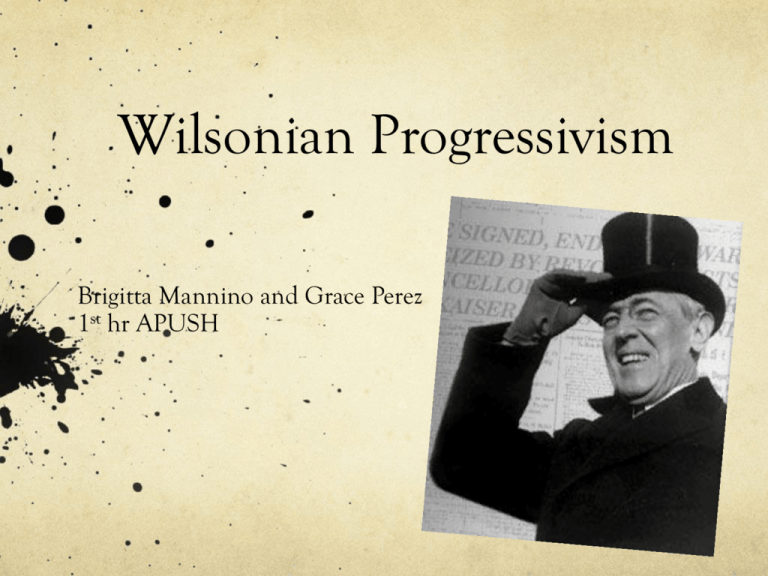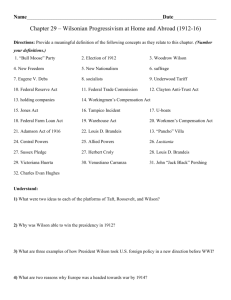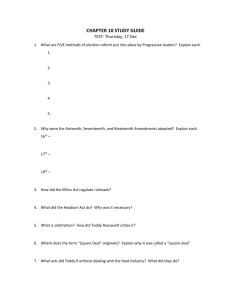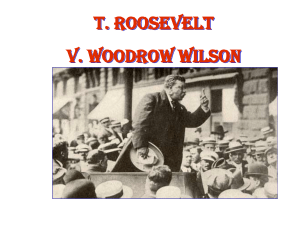Wilsonian Progressivism
advertisement

Wilsonian Progressivism Brigitta Mannino and Grace Perez 1st hr APUSH Campaign of 1912 Wilson’s New Freedom platform (Democrat): favored small enterprise, entrepreneurship, free functioning of unregulated and unmonopolized markets. Wilson’s main goal was the fragmentation of the big industrial combines, not regulation. Roosevelt’s New Nationalism platform: campaigned for women suffrage and a broad program of social welfare, including minimum wage laws, and “socialistic” social insurance Taft was also in the running for the Republicans, although he played a smaller role. He upheld the traditional Republican views and often butted heads with Roosevelt “I want to be a bull moose And with bull moose stand With antlers on my forehead And a big stick in my hand” Wilson’s Contribution Underwood Tariff: Wilson personally delivered his proposed tariff to congress, which the house swiftly passed. The tariff itself provided for a substantial reduction of rates, which was followed by a swarm of lobbyists seeking to disembowel the bill. This further proved that Wilson had the support of the majority of the public. http://www.youtube.com/watch?v=OWbXhpcys5I Wilson Vs. Bankers Banks were troubled by the inelasticity of the currency, which did not allow mobilization in times of financial stress into areas that were badly pinched. President Wilson endorsed Democratic proposals for a decentralized bank in government hands . This led to the development of the Federal Reserve Act. The Federal Reserve Act oversaw a nation wide system of twelve regional reserve districts each with its own central bank. Progressivism at Work Federal Trade Commission Act: empowered a presidentially appointed commission to turn a searchlight on industries and gage an interstate commerce. Commissioners were expected to crush monopolies by rooting out unfair trade practices. Clayton Anti-Trust Act: lengthened the shopworn Sherman’s Acts list of business practices that were deemed objectionable, including price discrimination and interlocking directorates usually achieved through holding companies. Other Acts Passed Federal Farm Loan Act: made credit available to farmers at low rates of interest. Warehouse Act: authorized loans on the security of staple crops La Follette Seaman’s Act: It required decent treatment and a living wage on American merchant ships. Resulted in freight rates rising with the crews’ wages. Acts Continued… Workingmen’s Compensation Act: granted assistance to federal civil-service employees during periods of disability. The Adamson Act: established an eight-hour day for all employees on trains in interstate commerce, with extra pay for overtime. Relevance to Contemporary Times The President continuous to work closely with congress to establish better relations with businesses. During reelection season the president will appeal to as many people as he can to gain the public support. Acts such as the Workingmen’s Compensation are still in affect today, protecting employees from being abused. Wilson ultimately benefited this country and provided for a better more stable nation. Relevance to Past Studies Wilson’s policies were quite similar to Jefferson’s policies which involved a working class and an appeal to the majority of the people. Earlier the Knights of Labor had fought for eight-hour work shifts which was later achieved through the Adamson Act.









